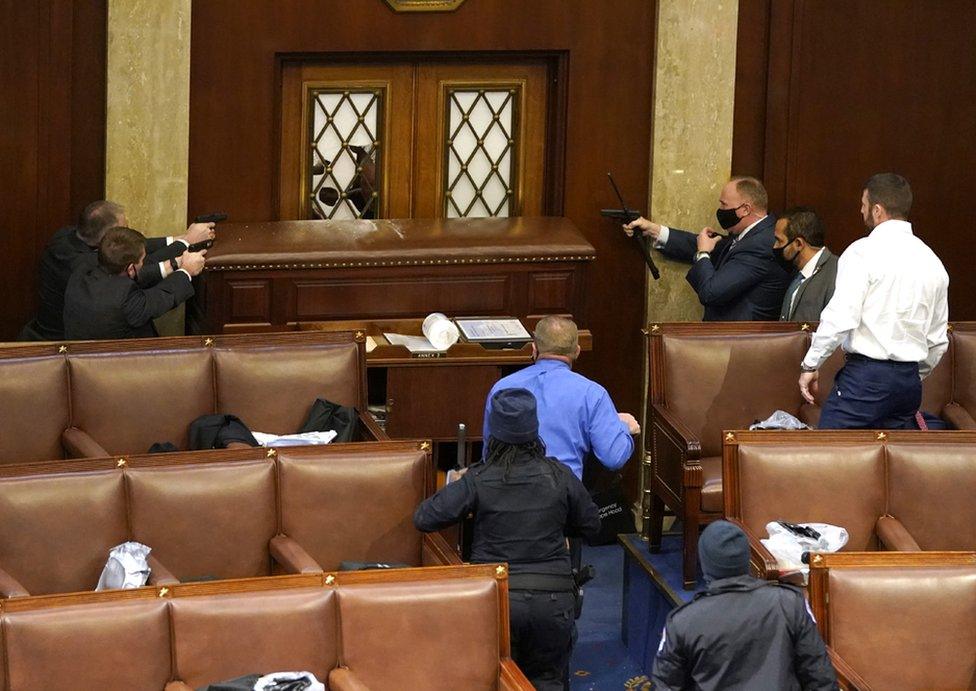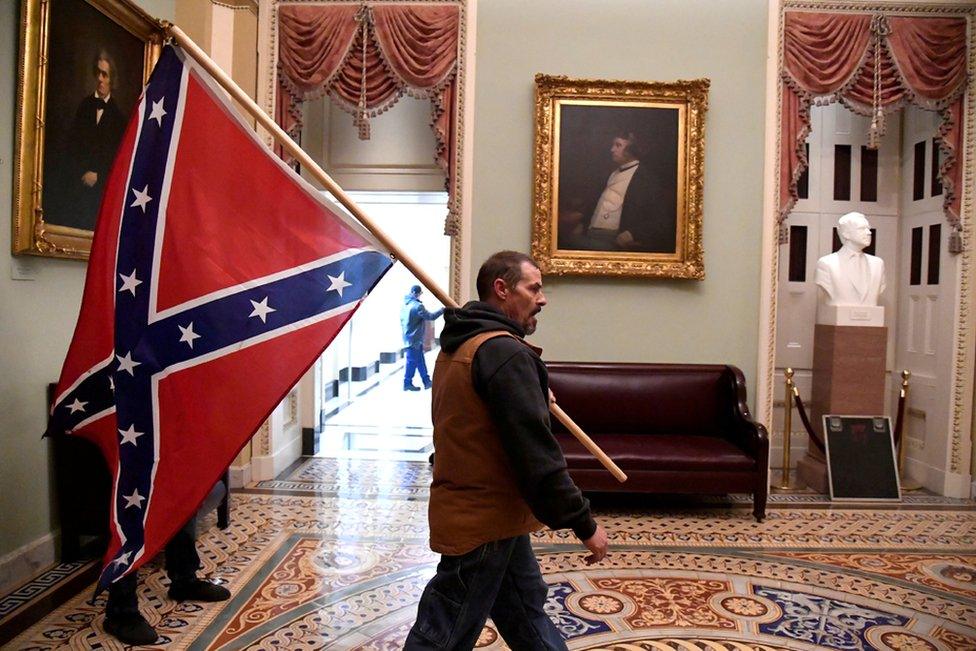Trump slams 'wayward' Republicans for Capitol riot vote
- Published
The storming of the US Capitol
Former US president Donald Trump blasted "wayward Republicans" after lawmakers made a rare bipartisan push to investigate the Capitol riot.
With the support of 35 Republicans, the Democratic-controlled House of Representatives voted 252-175 to look into the events of 6 January.
Party leaders had urged Republicans to oppose the bill, with Mr Trump labelling it a "Democrat trap".
The bill appears to lack the Republican support it needs to pass in the Senate.
It seeks to create an independent inquiry modelled on the commission that investigated the 9/11 attacks on New York and Washington.
The legislation establishes a 10-member body, evenly split between the two main parties, that would make recommendations by the end of the year on how to prevent any repeat of the Capitol invasion.
Trump supporters stormed Congress on 6 January in a failed bid to thwart certification of President Joe Biden's victory in November's election.
Wednesday's vote was seen as a loyalty test to the former president for members of his party.
All 10 of the House Republicans who voted to impeach Trump in the days after the Capitol riot for incitement of insurrection were among the 35 who voted for the commission.
In a statement after the vote, Mr Trump hit out at the "wayward" Republican group, saying, "they just can't help themselves".
"We have much better policy and are much better for the country, but the Democrats stick together, the Republicans don't," Mr Trump said, singling out several of his highest-profile Republican critics, including Utah Senator Mitt Romney.
"Sometimes there are consequences to being ineffective and weak," Mr Trump added.
Republican House Leader Kevin McCarthy dismissed the number of party defections in a weekly news conference on Thursday, saying: "I thought it would probably be higher."
He added that the idea of this Democratic-led House commission was "a lot of politics", noting that committees in the Senate were already conducting their own inquiry.
Asked if was willing to testify about a conversation he had with Mr Trump on the day of the riot, he responded, "sure".

On Wednesday, New York congressman John Katko, who negotiated the legislation with Democrats, said: "This is about facts - it's not partisan politics."
Mr Katko - the top Republican on the House Homeland Security Committee - said "the American people and the Capitol Police deserve answers, and action as soon as possible to ensure that nothing like this ever happens again".
But Marjorie Taylor Greene, a Georgia Republican, said the commission was a Democratic ruse "to smear Trump supporters".
Shortly before the vote, Tim Ryan, an Ohio Democrat, said on the House floor: "We have people scaling the Capitol, hitting the Capitol Police with lead pipes across the head, and we can't get bipartisanship? What else has to happen in this country?"

But the legislation faces dim prospects in the Senate, where the rules mean Democrats would need 10 Republicans to join them in passing it.
John Thune, the deputy Republican leader in the upper chamber, said he was concerned the inquiry would be "weaponised politically" in the 2022 election cycle.
Mr Trump has been dividing post-presidential life between his golf clubs in Florida and New Jersey and hinting about another run for the White House in 2024.
He continues to spread unfounded claims that last year's election was stolen from him - the conspiracy theory that drove many of his supporters to Capitol Hill on 6 January.
One of them, an unarmed woman, was shot and killed by police as she tried to break into the House chamber.
Two other protesters died of heart failure in the melee and one other from an amphetamine overdose.
A Capitol Police officer who tackled the protesters died of a stroke the following day. Two other officers took their own lives in the days after.
The Capitol Police union said one officer lost an eye during the attack and others sustained brain injuries.